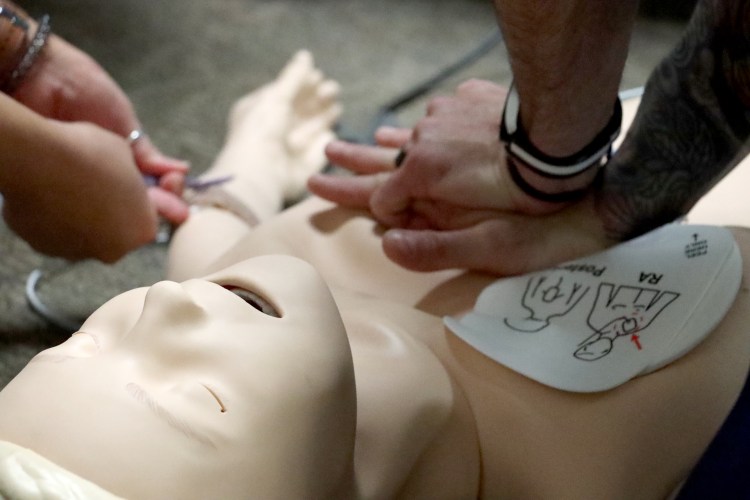Code Skills Out of Lab sessions bring sim lab to the learners

In terms of helping improve patient safety, UAB Clinical Simulation delivers.
Clinical Simulation’s Code Skills Out of Lab program effectively brings the sim lab to the learners, allowing facilitators to host code skills simulations for health-care team members within their own spaces.
“Staff in some areas might be less familiar with how to respond to a Code Blue,” said Andres Viles, Clinical Simulation’s director of immersive simulation. “So, to move the needle on patients’ survival, we’re empowering local teams to respond. We’ve found an opportunity to meet people where they are and help them deliver training with their staff and team members.”
Code Skills Out of Lab (OOL) sessions employ Rapid Cycle Deliberate Practice (RCDP), a teaching technique that focuses on rapid acquisition of skills, wherein participants rapidly cycle between deliberate practice and directed feedback until they’ve effectively mastered the subject.
Shantale Wheeler, R.N., is a professional development specialist in Medical Nursing. Through a needs assessment analysis, coupled with responding to Code Blues in the Inpatient Dialysis Unit (IDU), she recognized an opportunity to increase the delivery of high-quality CPR.
To develop a plan, she contacted Clinical Simulation to learn more about RCDP and OOL offerings.
“The ability to teach Code Blue simulations as frequently as needed was very appealing,” she said. “It provides a way of engagement with bedside staff in a more comfortable setting with the goal of improving patient outcomes through optimizing knowledge, efficiency and confidence, while delivering high-quality CPR.”
The program benefits learners by allowing them to practice in a safe environment, “while developing effective communication and teamwork skills needed when responding to a Code Blue,” she said.
Learner feedback has been resoundingly positive, Wheeler added, with many of her team members expressing gratitude and communicating “how empowered and confident they feel in their abilities when responding to an actual Code Blue.”
Now, Wheeler offers quarterly sessions for both rotating shifts in the IDU.
“Providing sessions at this frequency keeps the team proficient and optimizes outcomes for patients in cardiac arrest,” she said. “I’m also able to reach new hires during the onboarding process to ensure they are equipped with the tools needed to perform high-quality CPR.”
Kelly Wertz, R.N., ambulatory clinical development specialist, regularly facilitates Code Skills OOL sessions for the ambulatory nurse stat team, members of which run through the practice twice a month.
“What I love the most … are the looks on the first-time learners’ faces, because they realize they can do it,” Wertz said. “It’s wonderfully encouraging, as well as a great way to train.”
Code Skills Out of Lab opportunities are available to practically any department, Viles said. To learn more, visit uabsimulation.org or email simulation@uabmc.edu.
UAB Medicine’s Clinical Simulation program offers opportunities for individuals and teams across UAB Medicine and beyond to practice before they deliver care. We encourage all who provide and support patient care to “Sim First.” Together, we can put our patients’ safety first.




0 Comments